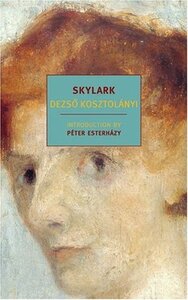Take a photo of a barcode or cover
dark
emotional
reflective
sad
slow-paced
reflective
slow-paced
Plot or Character Driven:
Character
Strong character development:
Yes
Diverse cast of characters:
No
Flaws of characters a main focus:
Yes
This book is descriptively picturesque (especially in the restaurant scenes) and follows the seemingly mundane lives of Skylark’s mother and father during the week of her departure, yet it was so gripping as the raw cruelty behind veiled truths were uncovered. The nature of co-existing consciences are so fascinating to me, especially in the chapter where Skylark’s father arrives from a night out with the boys and drunkenly reveals his callous sentiments around his own daughter (which is not dissimilar to the scene in Euphoria where Cal Jacobs has his grand cathartic moment of reveal, tell me I’m wrong). The dynamic interplay between fond acceptance and foul pity expressed as resentment - my heart aches for skylark, it really does.
An old Hungarian book about an elderly couple who live with their ugly, depressingly mediocre spinster daughter, Skylark. They've all given up on things improving, and live a resigned life devoid of much fun... Until one week when Skylark goes to visit family, and they can maybe let loose a little, and confront some hard truths.
This didn't do a lot for me, although some parts were fun. I thought the description of how Akos acted and thought when he was drunk was very realistic. Generally I found the writing a little too florid, and it didn't help that it was hard to remember who everyone was (mostly my fault given the unfamiliar Hungarian names). A lot of the book concerns meeting people, and gossip about people, so there are a lot of people (well, men, of course) to keep track of.
I was initially disappointed by the ending but now I think it fits what the author was trying to portray.
It was okay. I'm glad it wasn't any longer. I don't regret reading it but I wouldn't really recommend it.
This didn't do a lot for me, although some parts were fun. I thought the description of how Akos acted and thought when he was drunk was very realistic. Generally I found the writing a little too florid, and it didn't help that it was hard to remember who everyone was (mostly my fault given the unfamiliar Hungarian names). A lot of the book concerns meeting people, and gossip about people, so there are a lot of people (well, men, of course) to keep track of.
I was initially disappointed by the ending but now I think it fits what the author was trying to portray.
It was okay. I'm glad it wasn't any longer. I don't regret reading it but I wouldn't really recommend it.
Started reading this last year, accidentally abandoned it, picked this up again....and reminded again that THIS.IS.SO.GOOD. and I was SO MAD...and the fury reignited.
Skylark had no choice but to be born into a society that uses superficial criteria to determine value. It's not merely an inconvenience; it's a profound and unjust burden she bears throughout her life, and yet, the brutality she encounters is placed directly on her, as if she were deserving of it.
We are frequently severely judged for things that are beyond our control, but the story effectively emphasizes that nobody chooses their situation, whether it's family dynamics, cultural standards, or how we look. No one should feel sorry for Skylark; all she wants is some basic respect, but she is continually robbed of the dignity that is rightfully hers.
NOT EVEN THE PARENTS. Her mom joined the cycle- the ones that hold Skylark's frustration and sadness hostage and she drowned it internally. It's crazy how much social pressure affects how you perceive yourself and others, even towards your own child.
Skylark had no choice but to be born into a society that uses superficial criteria to determine value. It's not merely an inconvenience; it's a profound and unjust burden she bears throughout her life, and yet, the brutality she encounters is placed directly on her, as if she were deserving of it.
We are frequently severely judged for things that are beyond our control, but the story effectively emphasizes that nobody chooses their situation, whether it's family dynamics, cultural standards, or how we look. No one should feel sorry for Skylark; all she wants is some basic respect, but she is continually robbed of the dignity that is rightfully hers.
NOT EVEN THE PARENTS. Her mom joined the cycle- the ones that hold Skylark's frustration and sadness hostage and she drowned it internally. It's crazy how much social pressure affects how you perceive yourself and others, even towards your own child.
reflective
sad
slow-paced
Plot or Character Driven:
Character
Strong character development:
No
Loveable characters:
No
Diverse cast of characters:
No
Flaws of characters a main focus:
Yes
Moderate: Alcoholism, Body shaming, Misogyny, Sexism, Alcohol
Minor: Addiction, Animal cruelty, Body horror, Fatphobia, Blood, Classism
отак живеш поруч із кимось усе життя, без перебільшень, невідривно, і поняття не маєш, що вони собі мріють, тужать, прагнуть. тобто так, свої мрії, туги і прагнення ти від них теж старанно приховуєш, тому, якби спинитися, можна екстраполювати й подумати, що й у них має бути щось таке, але не спиняєшся, не замислюєшся, бо на поверхні все наче нормально – собі дорожче влаштовувати розкопки, потім же далі жити поруч.
і тільки іноді зорі стають так, що воно саме, ніби мимоволі, виривається назовні. згодом можна зверху все заполірувати та вдавати, що нічого не змінилося, однак фатальні слова були вимовлені, тепер втеча від істини неможлива: наприклад, як у прекрасній і трагічній історії дежьо костоланьї (тепер ви теж знаєте, як вимовляти це угорське ім'я), твоя дочка бридка і тридцятип'ятирічна, її ніхто не візьме заміж, життя не має сенсу.
*бо, справді, нащо взагалі жінки, якщо вони негарні? (бурчить, закочує очі, робить "бє-бє-бє" вираз обличчя).*
і тільки іноді зорі стають так, що воно саме, ніби мимоволі, виривається назовні. згодом можна зверху все заполірувати та вдавати, що нічого не змінилося, однак фатальні слова були вимовлені, тепер втеча від істини неможлива: наприклад, як у прекрасній і трагічній історії дежьо костоланьї (тепер ви теж знаєте, як вимовляти це угорське ім'я), твоя дочка бридка і тридцятип'ятирічна, її ніхто не візьме заміж, життя не має сенсу.
*бо, справді, нащо взагалі жінки, якщо вони негарні? (бурчить, закочує очі, робить "бє-бє-бє" вираз обличчя).*
An odd duck of a book about the parents of an ugly duckling woman. Actually, duckling is misleading given that their daughter (Skylark) is 35 years of age. It's also a misleading title since the book is about them, not her. It opens with Skylark going away for the week to spend time with relatives. This week away allows the parents to spend more time outside of the house, go to restaurants, visit the theatre, all manner of activities which, due, in no small part, to Skylark's sensitive nature and unwillingness to venture beyond her daily comforts, they rarely do. It's presented as though Skylark is the one who is holding them back but as the book goes along, the father (drunk for the first time in years) announces to his wife that their daughter is... ugly. She cannot find a husband and is still at home at 35 and they are both weighed down by this truth and must face it. The mother is somewhat shocked at this outburst and the book balances between this being the cause of their frustrations or simply being their excuse for them.
Written in 1924 but set in 1899, the book tells us that the parents are old despite only being in their 50s. But back then I guess that was old. Skylark is overweight, unattractive, and seemingly without any talents or gifts. The trend for children to remain infantilised and unable to fly the nest is a story we hear often about men (incels and the like) but not so much women, especially from this time period. It's hard not to assume the book is about the parents allowing their daughter's life to define them and, in turn, giving them the excuse they need to justify their own shortcomings. But I'm not entirely sure. That Skylark is the title of the book yet as a character she is only present in the first and last chapter (their week without her revealing the depths of the parents' misery and even shame regarding her) would suggest she is the least of their worries. Or maybe it's a simple satire on parenthood and the inevitability of disappointment. No-one wants to be ugly. But then... no-one wants to be the parents of the ugly, either.
An interesting book to be sure, and nicely written, but ultimately I was never entirely engaged by it. It plods along and you do occasionally smirk but overall, it probably won't live too long in the memory. Truth be told, a genuine story about Skylark, a narrative about (or from) her perspective, probably would have been more to my liking. Poor cow.
Written in 1924 but set in 1899, the book tells us that the parents are old despite only being in their 50s. But back then I guess that was old. Skylark is overweight, unattractive, and seemingly without any talents or gifts. The trend for children to remain infantilised and unable to fly the nest is a story we hear often about men (incels and the like) but not so much women, especially from this time period. It's hard not to assume the book is about the parents allowing their daughter's life to define them and, in turn, giving them the excuse they need to justify their own shortcomings. But I'm not entirely sure. That Skylark is the title of the book yet as a character she is only present in the first and last chapter (their week without her revealing the depths of the parents' misery and even shame regarding her) would suggest she is the least of their worries. Or maybe it's a simple satire on parenthood and the inevitability of disappointment. No-one wants to be ugly. But then... no-one wants to be the parents of the ugly, either.
An interesting book to be sure, and nicely written, but ultimately I was never entirely engaged by it. It plods along and you do occasionally smirk but overall, it probably won't live too long in the memory. Truth be told, a genuine story about Skylark, a narrative about (or from) her perspective, probably would have been more to my liking. Poor cow.
We'll be traveling to Hungary soon and this book is one of the few available in translation here by a popular Hungarian writer of the early 20th century, Dezs�� Kosztol��nyi.
So first I'll say that the writing was very enjoyable, that I came to really like characters that I thought at the beginning would bore me to tears the whole book, and that the book can be incredibly funny at times. But, by God, this book was depressing to me. At the end I wanted to scream "Affect change! All of your lives could be so much better! So much more!" Silly American that I am.
So there is a small family. An "ugly" daughter--a spinster at 35, and her two adoring parents. She maintains the house and their lives. The parents adore her. She is to go on a short trip to the country. They are all devastated. What in the world will they do for the whole week? The answer turns out to be, have a freakin life.
According to the introduction, Kosztol��nyi found it pretty much impossible to write about anything but the fact that we are dying. The examples of personal suffering are poignant, no one in the book is NOT suffering the daughter's fate as all of their hearts break along with hers. But myself, free from the 20th-century Magyar's baggage and saddled with my own American millennial mindset was so angry at them for not doing something to make things better. Don't get me wrong, I didn't want or expect her to get a makeover or marriage prospects. (I would have been way more angry at the end.) I just want them to do something to make their lives better instead of suffering so much, but I guess, realistically or fatalistically, that's generally not how life is.
PS - We are all dying. Thanks, Kosztol��nyi.
So first I'll say that the writing was very enjoyable, that I came to really like characters that I thought at the beginning would bore me to tears the whole book, and that the book can be incredibly funny at times. But, by God, this book was depressing to me. At the end I wanted to scream "Affect change! All of your lives could be so much better! So much more!" Silly American that I am.
So there is a small family. An "ugly" daughter--a spinster at 35, and her two adoring parents. She maintains the house and their lives. The parents adore her. She is to go on a short trip to the country. They are all devastated. What in the world will they do for the whole week? The answer turns out to be, have a freakin life.
Spoiler
So they get dragged back into their social connections and personal interests and have a delightful week. She spends a week in the country not getting the husband and family that she so desperately wants or enjoying the company of her extended family, and then she comes back. They go back to being shut-ins with bland food instead of awesome goulash and palinka parties.According to the introduction, Kosztol��nyi found it pretty much impossible to write about anything but the fact that we are dying. The examples of personal suffering are poignant, no one in the book is NOT suffering the daughter's fate as all of their hearts break along with hers. But myself, free from the 20th-century Magyar's baggage and saddled with my own American millennial mindset was so angry at them for not doing something to make things better. Don't get me wrong, I didn't want or expect her to get a makeover or marriage prospects. (I would have been way more angry at the end.) I just want them to do something to make their lives better instead of suffering so much, but I guess, realistically or fatalistically, that's generally not how life is.
PS - We are all dying. Thanks, Kosztol��nyi.





